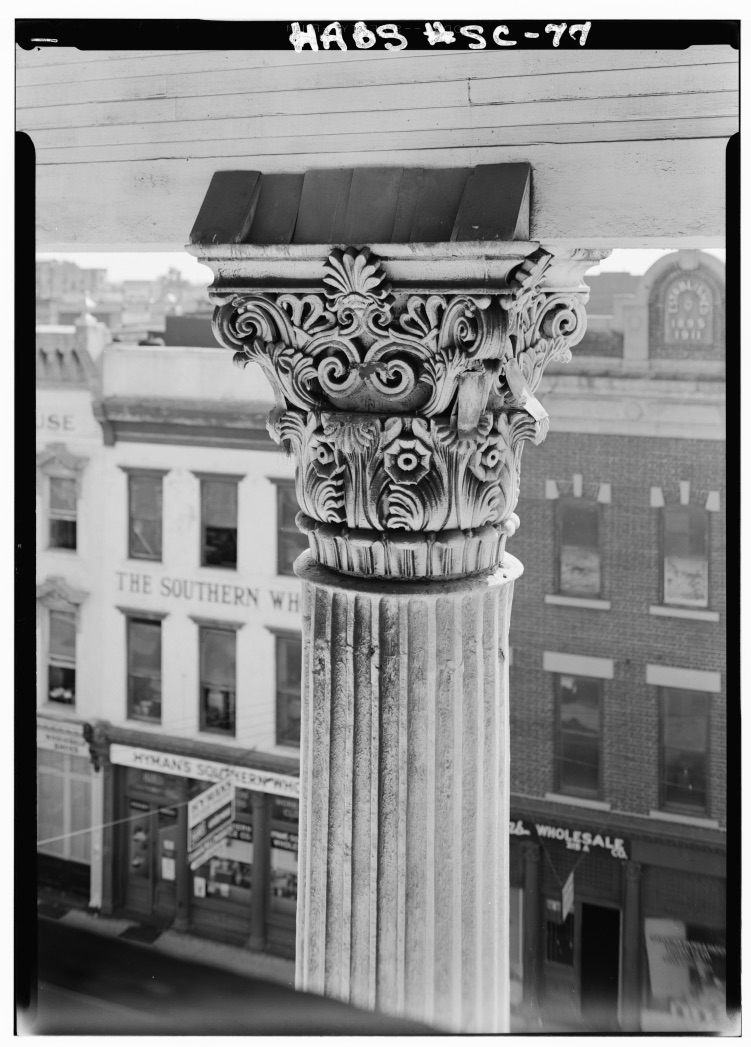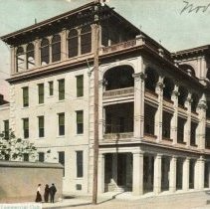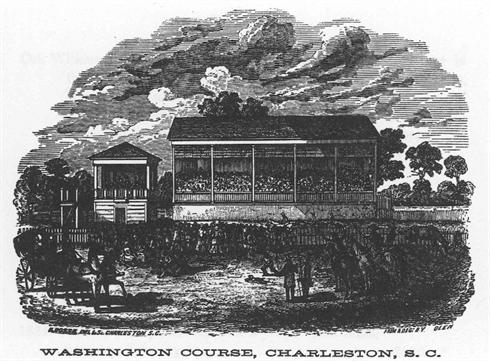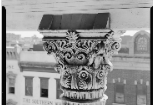

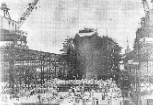

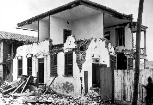

CHARLESTON HITS BOTTOM
March 1865 - 1911
1865
May 1 -- Thousands of emancipated slaves marched in a parade to the old Washington Race Course, which had served as a Union POW camp during the Civil War. There they exhumed mass graves and reburied the Union dead with respect and ceremony, then celebrated their newfound freedom with speeches and a picnic. Some credit this celebration as the nation's first Memorial Day.
1866
Jan. 30 -- The melted fragments St. Michael's bells were shipped to England to be recast, following their destruction during Sherman's burning of Columbia, where they unfortunately had been hidden for safe keeping.
Oct. 15 -- Horse-drawn car service, predecessor of the trolley system, begins in Charleston.
1867
June 22 -- A Category 1 hurricane, which still holds the record as the earliest landfalling hurricane in the National Weather Service's Charleston area, made landfall at Isle of Palms, then weakened to a tropical storm before moving through the Pee Dee and into central North Carolina.
1868
Feb. 22 -- John G. Grant of Marlboro District filed a petition of bankruptcy in the District Court of the United States, District of South Carolina, in Charleston. A meeting of his creditors were advised to choose assignees of his estate at 59 Broad St., on April 1.
1870
April 24 -- Maria Louisa Porcher was born.
1874
Sept. 27/28 -- A Category 1 hurricane made landfall on Seabrook Island, producing downed telegraph lines and extensive wharf/crop damage in Charleston along with two recorded deaths.
Dec. 20 -- The New Wappetaw Presbyterian Church was dedicated in McClellanville, at ceremonies presided over by the Rev. Drs. John Girardeau and Gilbret Brackett, representing the Charleston Prebytery. The church is still in use today. (Source: Home in the Village, p. 125)
1882
Sept. 4 -- The bells of St. Michael's rang city curfew for the last time. (Source: Broad Street and Beyond, p. 41.)
1885
June 7 -- Minutes taken during a meeting of the New Wappetaw Presbyterian Church stated: "Charleston Presbytery at its most recent meeting adopted the following statement: 'This Presbytery has learned with sorrow of troubles which exist in New Wappetaw Church, that impair the efficiency of that church and hinder the progress of the redeemer's kingdom in that community. Therefore be it resolved that a commission of Presbytery be appointed to visit said church and make inquiries into the nature of those difficulties, and with full power to take such action in the premises, as under the law of our church their wisdom might suggest.'" (Source: Home in the Village, p. 126)
1886
March 14 -- Mrs. S. A. Lofton wrote a letter to New Wappetaw Church saying "The unchristlike and official misconduct of R.T. Morrison, Jr., J.B. Morrison, and A.W. Leland towards my family necesessitates my removal from your church." (Source: Home in the Village, p. 127)
Aug. 31 -- The largest earthquake ever recorded on the East Coast, estimated to have been a 7.2 on today's Richter Scale, struck Charleston.
1889
June 6 -- Arthur Trezevant Wayne married Maria Louisa Porcher.
1896
Sept. 12-- Harper’s Weekly published an editorial cartoon, proposing what the U.S. Supreme Court might look like if William Jennings Bryan won that year’s presidential election. Among the supposed “justices” are Illinois Gov. John Peter Altgeld (rising at center) and to his left, South Carolina’s Sen. “Pitchfork Ben” Tillman holding said farming implement. The U.S. Constitution lies on the floor.
1897
Dec. 13 -- The first local large-scale party featuring roasted oysters was sponsored by the Grand Lodge of Ancient Masons on Remley’s Point.
1898
May 3 -- Septima Poinsette Clark was born.
1899
Dec. 29 -- The South Carolina Jockey Club disbands and donates its property, the former Washington Race Course, to the South Carolina
Library Society.
1901
Jan. 10-- Navy Board members recommended Charleston as the site of its new Navy Base.
March 3 -- The Naval Appropriations Act provided funding for a new Navy Base just north of Charleston along the banks of the Cooper River.
Aug. 13 -- The city of Charleston sold the former Chicora Park, a few miles north of the city along the Cooper River, to the U.S. Navy to create a base and shipyard.
Dec. 1 -- The South Carolina Inter-State and West Indian Exposition opened amid much fanfare on the grounds of the forner Washington Race Course (and afterward Hampton Park.)
1902
Jan. 25 -- Linnelle Hall (m. Griggs) was born in Marlboro County.
Sept. 27 -- The Evening Post, in its coverage of the opening of the new Commercial Club, noted that the building's fourth floor was enclosed in glass that could be opened, "making a delightful resort to spend the evenings during the summer months."
1903
Jan. 19 -- S.C. Lt. Gov. James H. Tillman, BenTillman's nephew, fatally shot Narciso Gener Gonzales, editor of The (Columbia) State newspaper, during a confrontation on the S.C. State House steps.
1906
May 4 -- On the Belmont Race Track’s opening day, nearly 40,000 people streamed through the former Washington Race Course gates at their new New York home.
July 4 -- David Doar, one of the last Lowcountry rice planters, was the keynote speaker for the Agricultural Society of St. James Santee, on the occasion of the 200th anniversary of the parish. (Source: Home in the Village, p. 13)
1910
Jan. 1 -- A reporter for the News and Courier wrote: “Traveling men usually remember the places they visit by the kinds of hotels at which they stopped. In Charleston there is one hotel that the consensus of opinion has named ‘The Best.’ This is the Charleston Hotel … a part of [the city’s] traditions.”
1911
Aug. 27 -- The Great Hurricane of 1911 made landfall on Hilton Head Island as a Category 2 storm with winds near 100 mph. With wind speeds still at 94 mph when it passed over Charleston, the storm surge drove salt water into Lowcountry rice dikes, effectively putting an end to the industry that was the underpinning of Charleston's great wealth for nearly two centuries.
